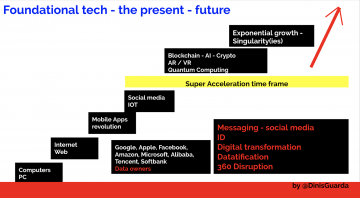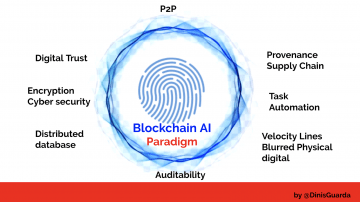
We live in a fast, disruptive, technology-driven world where concepts like digital transformation and the 4IR (industry 4.0) – AI, Blockchain, IoT, Fintech, have influence on everything we do as individuals, and in the shaping of our cities and countries. This is a world filled with promise and opportunities but also many challenges.
The Fourth Industrial Revolution was defined by Klaus Schwab as the fourth major industrial era in the aftermath of the 18th century Industrial Revolution. It ‘s main characteristic is the fusion/interconnection of technologies which are leading to a blurring between the physical, digital, and biological spheres; collectively referred to as cyber-physical systems.

What is driving the 4IR is a set of data driven technologies that have the potential to radically change our economic models, increase productivity, and improve our lives. The 4IR results from an increasingly quick digital transformation happening in the world. That digital transformation brought us many evident benefits, but is now stepping into a second stage that brings us to the verge of a whole new set of important challenges. One of these is the growing awareness of how our economic activities are impacting climate change, the other is job loss and a radical transformation of what we understand as work and how that defines our identity as humans.
2018 was annus horribilis in terms of global climate catastrophes. It is irrefutable that the present economic system and human action are triggering the changes in climate. On the other hand, 4IR’s most praised asset is their ability to increase productivity. But what kind of productivity are we talking about? Do we want productivity at all costs, with its implicit externalities, such as its impact on climate change, or are we able to do it more sustainably and mindful of the waste it produces? And can the 4IR enable us to shift to more beneficial economic systems such as the circular economy?
Another important risk of the 4IR is how it affects what we understand now as jobs/work. We have already seen how the way we work and live has changed so much over the past decades; this will only increase. In the first stage, 4IR will impact primarily the lives of machine operators and food workers, but job loss is expected to expand to all kinds of areas. This is a development that has sparked much public concern and that governments and nations as a whole cannot ignore anymore.
In this article, I begin by introducing and describing some of the key concepts of digital transformation and 4IR, which are currently taking our world by storm. We will then focus on some of the key technologies driving the current shift and bringing most change to the world. Subsequently, we shall tackle what are the opportunities and challenges that these technologies and the 4IR bring.
A World Governed by Digits: Digital Transformation
Even if we do not think about it, our world is governed by digits. The smartphones that we all hold in our pockets, our little helpers, are small digital machines loaded with powerful chips coded in ones and zeros. These computation devices have had their sizes reduced incredibly over time, but their capabilities keep expanding exponentially. It has been a long journey since the invention of the first digital calculating machine during the forties. It resulted in subsequent computers and then the invention of the internet, which has shaped the world as we know it now. The web and its devices became the core instruments around which we govern our lives, impacting the way we live, work, and relate to each other. These technological evolutions have also disrupted many of our known systems and behaviours, while heavily challenging existing business models, governance processes, and socialization.
What we just described is called “Digital transformation”. What triggered it was the increasing widespread digitisation of the world. One way then, to define it, is as “the novel use of digital technology to solve traditional problems
Another possible way of looking at digital transformation is the one provided by Shahyan Khan (2017), who analysed the societal effect of digitalization. As Khan explains, digitization, the process of converting information into bits (i.e. a computer-readable format), has enabled the process of digitalization. He writes: “Digitization (the technical conversion), digitalization (the business process) and the digital transformation (the effect) therefore accelerate and illuminate the already existing and ongoing horizontal and global processes of change in society.”

This in turn contributed to the transformation of existing business models, consumption patterns, socio-economic structures, legal and policy measures, organizational patterns, cultural barriers, communication processes, et cetera.
The opinions on how fast and selective we want to digitally transform our society and our economy change considerably. However, the digital transformation seems to have a life and a will of its own. It just happens. Any country located in Europe and the western world is already experiencing the results of that fact, and an increasingly larger number of developing countries are coming onboard. Every year that goes by increases the level of openness and interconnectivity happening in our economic and social activity. This is driven by growing digitization and a large proportion of technology-intensive economic sectors being shaped by globally hyper-connected marketplaces.
According to a recent research by McKinsey, the sectors that will be mostly affected by Digital Transformation are Banking, Media and Entertainment, Pharma, Retail, Hospitality and Travel, Insurance and Public Sector.
The impact of digital transformation is not only economical. It also questions our existing culture and way of thinking, doing, and communicating, and the governance and management models that we embraced over the last 200 years.

Dinis Guarda is an author, academic, influencer, serial entrepreneur, and leader in 4IR, AI, Fintech, digital transformation, and Blockchain. Dinis has created various companies such as Ztudium tech platform; founder of global digital platform directory openbusinesscouncil.org; digital transformation platform to empower, guide and index cities citiesabc.com and fashion technology platform fashionabc.org. He is also the publisher of intelligenthq.com, hedgethink.com and tradersdna.com. He has been working with the likes of UN / UNITAR, UNESCO, European Space Agency, Davos WEF, Philips, Saxo Bank, Mastercard, Barclays, and governments all over the world.
With over two decades of experience in international business, C-level positions, and digital transformation, Dinis has worked with new tech, cryptocurrencies, driven ICOs, regulation, compliance, and legal international processes, and has created a bank, and been involved in the inception of some of the top 100 digital currencies.
He creates and helps build ventures focused on global growth, 360 digital strategies, sustainable innovation, Blockchain, Fintech, AI and new emerging business models such as ICOs / tokenomics.
Dinis is the founder/CEO of ztudium that manages blocksdna / lifesdna. These products and platforms offer multiple AI P2P, fintech, blockchain, search engine and PaaS solutions in consumer wellness healthcare and life style with a global team of experts and universities.
He is the founder of coinsdna a new swiss regulated, Swiss based, institutional grade token and cryptocurrencies blockchain exchange. He is founder of DragonBloc a blockchain, AI, Fintech fund and co-founder of Freedomee project.
Dinis is the author of various books. He has published different books such “4IR AI Blockchain Fintech IoT Reinventing a Nation”, “How Businesses and Governments can Prosper with Fintech, Blockchain and AI?”, also the bigger case study and book (400 pages) “Blockchain, AI and Crypto Economics – The Next Tsunami?” last the “Tokenomics and ICOs – How to be good at the new digital world of finance / Crypto” was launched in 2018.
Some of the companies Dinis created or has been involved have reached over 1 USD billions in valuation. Dinis has advised and was responsible for some top financial organisations, 100 cryptocurrencies worldwide and Fortune 500 companies.
Dinis is involved as a strategist, board member and advisor with the payments, lifestyle, blockchain reward community app Glance technologies, for whom he built the blockchain messaging / payment / loyalty software Blockimpact, the seminal Hyperloop Transportations project, Kora, and blockchain cybersecurity Privus.
He is listed in various global fintech, blockchain, AI, social media industry top lists as an influencer in position top 10/20 within 100 rankings: such as Top People In Blockchain | Cointelegraph https://top.cointelegraph.com/ and https://cryptoweekly.co/100/ .
Between 2014 and 2015 he was involved in creating a fabbanking.com a digital bank between Asia and Africa as Chief Commercial Officer and Marketing Officer responsible for all legal, tech and business development. Between 2009 and 2010 he was the founder of one of the world first fintech, social trading platforms tradingfloor.com for Saxo Bank.
He is a shareholder of the fintech social money transfer app Moneymailme and math edutech gamification children’s app Gozoa.
He has been a lecturer at Copenhagen Business School, Groupe INSEEC/Monaco University and other leading world universities.










